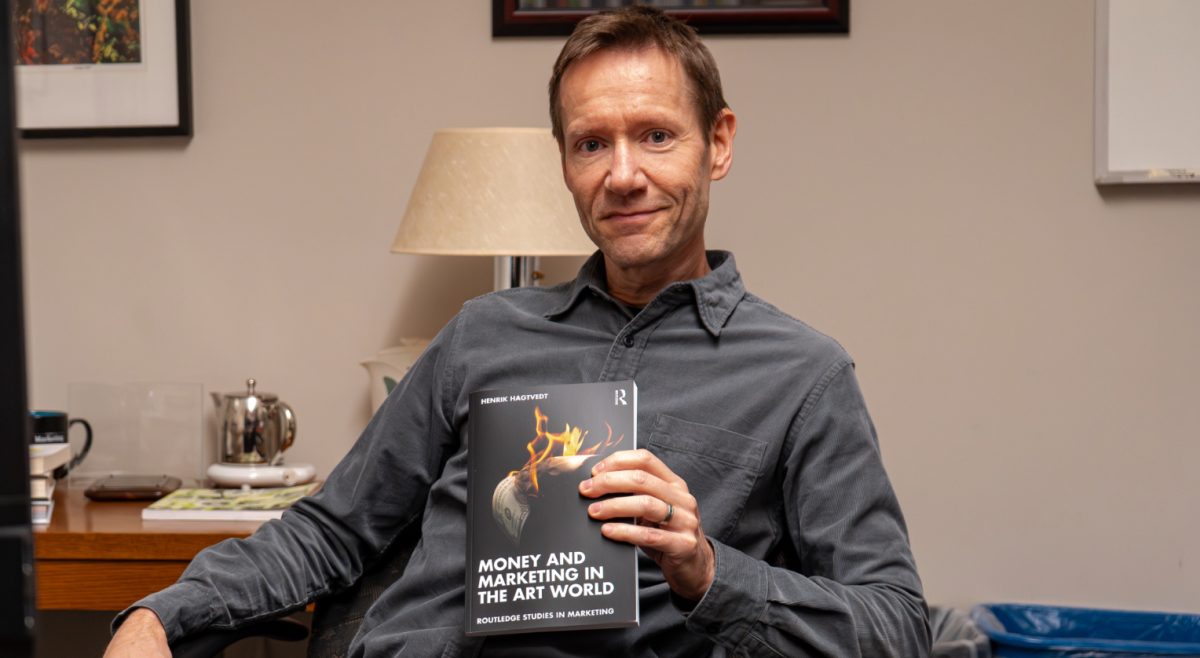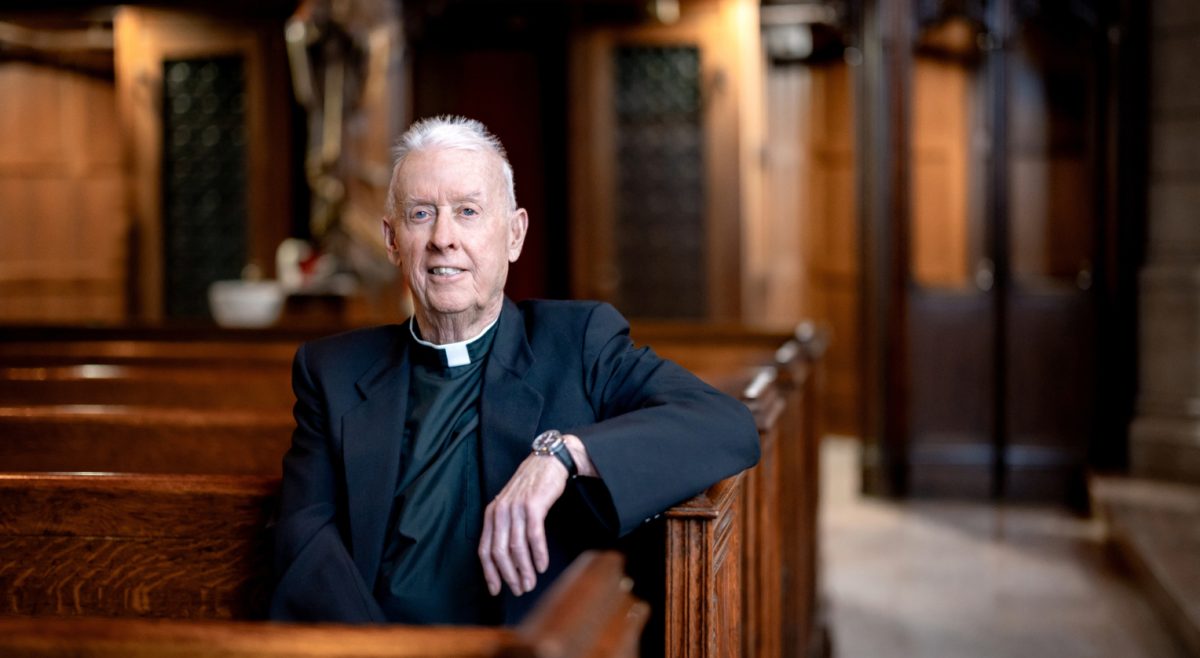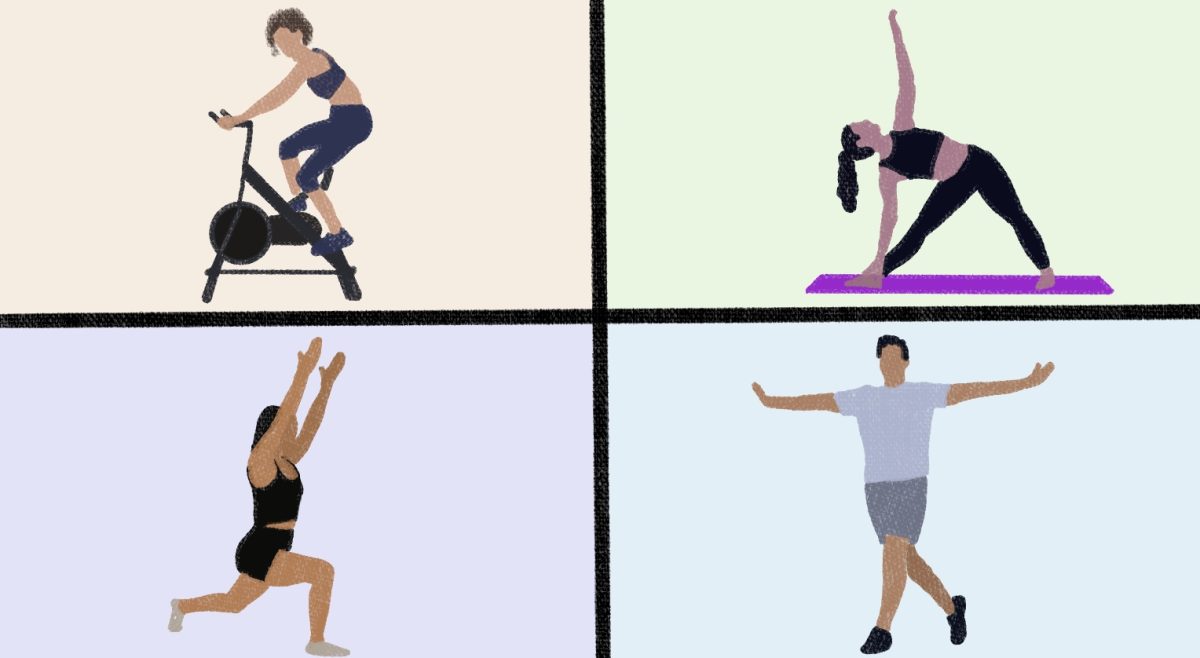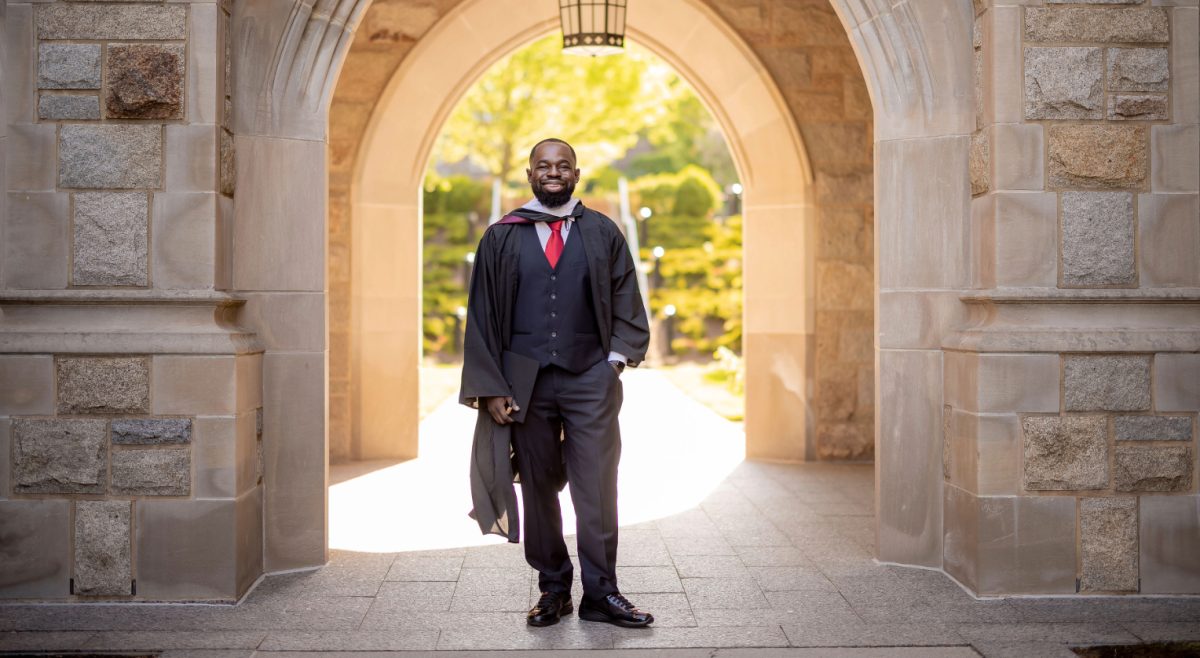When senior Michael Zuppone returned from Spring Break, he was on what can best be described by him as an “Appa high.” Zuppone had participated in the Appalachia Volunteers Program—one of Boston College’s many service-immersion opportunities—for the third time since his freshman year at BC. Through the program, he had previously traveled to Roanoke, Va. and New Orleans, and he spent his final Appa trip in Trenton, N.J.
The week he returned to BC, Zuppone felt as though for the next two months, the world was his oyster. He was aware of the fact that other universities were switching to remote instruction due to COVID-19—he just never thought BC would be one of them.
March 10, the day Governor Charlie Baker declared a state of emergency in Massachusetts, was the day that Zuppone felt as though everyone around him had transitioned into “panic mode.”
That evening, he participated in a virtual UGBC Senate meeting to discuss campus safety in the midst of COVID-19. Out of 33 senators, 25 voted in favor of a letter urging the University to switch to online instruction, and Zuppone was one of them. Though he supported the letter, Zuppone never expected BC to send students home.
Zuppone was not the only UGBC member who was feeling the pressure in mid-March. Leonardo Escobar, MCAS ’22, had been hearing about the coronavirus since late December on podcasts he listened to—but the virus still felt like a distant problem until that point. As a UGBC senator, Escobar first experienced a heightened realness regarding the coronavirus at the Senate’s last Tuesday night meeting, which was held over Zoom.
“We were asking, ‘Do we know anything at this time?’” Escobar said. “That night, it became a lot more real from a UGBC standpoint, since everybody was expecting someone to know something.”
With family in China at the time of the initial outbreak, Flora Ding, MCAS ’23, had been acutely aware of what the spread of COVID-19 could spell for the United States when the time came for BC to shut its doors for the semester. Hailing from Wuxi, Ding had seen what the initial spread of the virus across China meant for her family.
“I was really worried back then, because my family and friends were all in China, and they were at risk of this contagious disease,” Ding said. “I just hoped it wouldn’t spread outside of China to America, to BC.”
But once BC moved classes online for the semester and told its students to move out, Ding was one of many students who didn’t know exactly where to move out to. Being thousands of miles away from home was just one of the worries that Ding and her parents shared about the move out. Travel restrictions at this time can be tough to navigate, and the very act of flying on a plane could put her at further risk, Ding said.
So Ding successfully applied to stay on BC’s campus—BC said it would allow students with “international travel restrictions, serious personal reasons, or University obligations” to stay on campus. She stayed put in her Loyola double as campus emptied around her. When her fellow extended-stay students moved from their former residence halls to freshman housing on Upper Campus, the halls were filled again.
Thousands of miles away, Isabella DePalo Garcia Perez, MCAS ’21, was spending her spring semester abroad in Quito, Ecuador. Perez was one of many BC students who said goodbye to Chestnut Hill in December and embarked on what they thought would be months of abroad learning. Due to the novel coronavirus, though, she found herself in the same position as students across the world, being told to leave her university early.
Perez said a screenshot of the email that classes would be moving online from BC was sent to her and her peers on March 11—and discombobulating panic ensued. Her friends were receiving messages from their universities demanding they come back. Though she thought she had more time to say goodbye, hearing from her program director that she had to be out of Ecuador was jarring in more ways than one.
“They had said on the news that they were closing the country Sunday night at midnight to foreign nationals, and then they would close it to citizens Tuesday morning at midnight,” she said. “It was kind of like a really quick turnaround.”
Perez spent her last few days surrounded by friends from her program. Her fondest memory, she explained, was tackling the difficult assent to Quilotoa, a lake nested into a volcanic crater in the Ecuadorian Andes—which she did on March 14, two days before she left.
Ecuador had its first confirmed case of COVID-19 on Feb. 29—a woman who lived in Spain had returned to Ecuador for Carnival celebrations. After that, things began to shift, Perez said. As rumors flew across campus, Perez and her peers in Ecuador began to suspect that programs would be shut down. She began to feel fear mounting around her in her community in Ecuador.
“There was fear about leaving the house,” Perez said. “Especially because there are a lot of respiratory issues in the Andes and on the coast, so most people do have asthma. So that was kind of a big concern in the country in general.”
Back on campus, students were reeling from the letter sent out, and hastily spending their last four days with as many people as they could on campus.
“Once that time of day came around, I actually just dropped my responsibilities and started building legos with my roommates,” Escobar said. “Once it finally came, we were literally about to go to dinner and then it came and the group just suddenly shifted. We were like ‘Wow, we have no idea what to do.’”
After eating dinner at Lower, Escobar and his roommates decided to walk through the Mods, which made his emotions feel much more real, since he could see everyone else feeling them too, he said.
“It gave you the very essence that in a sense, nothing matters,” Escobar said. “We don’t have class tomorrow. All we really know is we’re packing up soon and we gotta say goodbye. For the level of sadness there was, there was a level of appreciation for how everyone came together.”
For Zuppone, he’s saying goodbye to time at BC as an undergrad for good.
“March 11th … I think that’s a day that will go down in infamy for the Class of 2020,” Zuppone said.
The moment Zuppone received University President Rev. William P. Leahy, S.J.’s email notifying students of BC’s transition to remote instruction, he was finishing an online Zoom class with international studies professor Erik Owens, who had preemptively made the decision to test out the digital class format prior to the University-wide policy.
Suddenly, Zuppone heard his roommate screaming from another room in his Vouté quad, and he knew that something drastic had happened.
“I was basically kind of in a state of shock for the rest of that night,” Zuppone said. “On one hand, I was sad about losing the rest of senior year, but on the other hand, I was also scared about what was going to happen with the virus and uncertain about how things were going to proceed.”
After calling his parents, Zuppone began to participate in the informal Senior Week activities the Class of 2020 had lovingly, recklessly, and desperately thrown together. He took a walk around Lower Campus to soak in the sights—the seniors had congregated in the Mods, and whether they were crying, hugging one another, on the phone with family members, dancing, or drinking, the Class of 2020 had come together.
The next few days were a blur, with seniors revisiting their freshman year dorm rooms, taking pictures in suits and white dresses in front of Stokes and Gasson, and attending quite a few “Mod weddings”—a senior tradition in which two friends have a mock wedding, oftentimes themed, and always accompanied by anecdotes and dancing. The “Senior Week” culminated in the Senior Sunrise, an annual tradition in which the senior class pulls an all-nighter and then gathers together to watch the sun come up on the day before graduation.
“That was kind of an expression of profound sadness and gratitude all at once, because it was our last hurrah as a senior class,” Zuppone said.
Zuppone hadn’t seen so much of the Class of 2020 in one place since the Superfan shirt picture day during Welcome Week. Students sat on the outskirts of the reservoir, taking it all in. But when Zuppone made his way back to campus on March 15, the time came for him to leave campus, and head home to Manhattan on New York City’s Upper West Side—the epicenter of the outbreak in the United States.
Perez was struggling to make her own journey home. Not only was she under a stressful time crunch, but flights came in around $1,000 to $3,000, which surpassed her price range. After visiting the U.S. Embassy in Quito—where she said she was not offered any help with flights—Perez found an affordable trip that left Ecuador on March 23 at 6 a.m. With the approval of her program director, she said goodbye to Ecuador and returned home to Natick, Mass.
Within a span of six days, Perez had to say goodbye to a program she was passionate about, friends she cared about, and a host family she loved.
Escobar, a Cambridge native, said he is always the last of his friends to leave campus, so he stayed until Sunday. But because his parents’ age put them in a vulnerable state to the virus, Escobar knew he didn’t want to go home. A friend lent him his apartment in Medford, Mass. to stay in.
“[The apartment] gave me my own safe space, without which I might not have been able to be as comfortable with having been worried about my parents,” Escobar said. “Luckily I’ve been presented with a kind gesture where I was lent a safe haven to set up a workspace.”
At first, the transition to living alone in this new space was difficult, Escobar said. After settling in, he started feeling sick, which created concerns he had the coronavirus. As online classes started, Escobar began feeling better, which he said allowed him to focus on his classes.
Despite the challenges of online learning and being responsible for providing everything for himself, Escobar said this process has taught him a lot.
“I think anyone moving from high school to college starts asking themselves ‘Oh, how do I budget my day out now that I’m responsible for all these things myself?’” Escobar said. “That’s been a plus for me personally. Does it outweigh all of the amazing memories I was making at BC? I don’t know, but it hasn’t been the worst thing in the world.”
Back home, Perez wakes up early, reads over her homework assignments to make sure she’s caught up, and then makes her way to her guest room, where she’s set up a makeshift office for herself. Ecuador is only an hour behind due to the United States recognizing daylight saving time, so Perez’s schedule hasn’t changed much. One challenge, she explains, is working in a group setting with her peers, who are now scattered across the world.
“I have two classmates that are from Japan,” she said. “One that’s from Finland. A few that are from the U.K. So trying to coordinate group projects with them is definitely far more difficult.”
Though class attendance time hasn’t changed too drastically, Natick is worlds away from Ecuador. Perez lives with her mom, who is immunocompromised, so she has been isolating as much as she can within her house. She moves from her bedroom to the guest room for class, and then tries to take solitary walks around her neighborhood, which she says is weirdly empty.
Perez also faces the unique challenge of taking her classes in a language other than English. At Universidad de San Francisco de Quito she said that professors were able to read the room and know when to use English in class to help students who spoke Spanish as a second language. Over Zoom, it’s much more difficult to adapt their discussion-based classes.
Perez has also had to think about income while social distancing in Natick. Before going abroad, she worked three on-campus jobs. One was in the Volunteer and Service Learning Center in the Division of Mission and Ministry, another was in the Vice President for Student Affairs—both of which were work-study jobs—and the last was in the Hillside bookstore. Initially, she planned to return to work once she realized she would be coming back from Ecuador, but quickly realized everyone on campus would be working remotely or not at all.
“I don’t really have an income at the moment, which is kind of worrying,” she said. “Especially because I have to buy a lot of the groceries and things of that nature … a general feeling is that everyone doesn’t have access to their job, or access to money, which is kind of creating a lot of concern.”
Perez’s advice for students returning from abroad is to stay in touch with the people from the country where their program was. Regularly talking to her host family and friends back in Quito not only helps her Spanish speaking ability, she said, but it gives her something to look forward to throughout the day.
Through the entire tense and stressful process of returning home and hitting the ground running, Perez has recognized the silver linings. She’s found it comforting to be back with her mom, who she’d call everyday while abroad, and she says it’s refreshing to see all of her hometown friends back in one place after being away for so long—even if they have to stay six feet away from each other.
As for his classes, Zuppone is faring the best he can with no concrete workspace for himself—his dad is a lawyer who is now working from home in the apartment’s den. Zuppone has been testing out different areas of the house to find one that’s most conducive to this new method of learning, and it hasn’t been without its hitches. During one of his lectures on Zoom, Zuppone’s professor brought up a philosophical concept that his dad overheard from another room, prompting him to say “I remember learning about that in school!” as Zuppone frantically searched for the mute button.
Coming home has been a bittersweet experience for Zuppone. While spending time with his parents has been restorative, he’s been missing his friends and the feeling of being on campus. Luckily, his Appa group held the traditional post-trip reflection via Zoom, which gave the program Zuppone had spent three of his four Spring Breaks participating in some closure.
With the situation worsening in New York City every day, Zuppone has felt fear and apprehension toward leaving his house to go to the grocery store. But one thing he said he knows for sure is the grit and resilience of New Yorkers—no matter what, the city will face the consequences of the COVID-19 outbreak together.
Escobar says that focusing on the greater good helped mitigate the sadness of sacrifices he had to make. For him, conversations with professors or parents about the effects of the virus on their lives were especially poignant reminders of how dependent humans are on each other.
“When [people] feel like they can’t do the things they usually do to use their minds or to bring them joy, that’s always tough to hear and reminds me why this whole effort is going to be really important to them and to the rest of the world,” Escobar said.
As for Ding, she finds staying on campus rather advantageous for staying on top of her coursework.
“I find it a little inconvenient to go back to China while keeping up with my studies because I have a lot of humanities, history, or literature classes that are all livestreamed, so I can’t just watch a recording,” Ding said. “And a lot of these classes are in the afternoon in local time, and if I go back to China I face the time zone issue—I’d have to stay up until 3 in the morning to have a history discussion.”
Motivation to keep a rigid schedule to stay on top of coursework hasn’t come easy to many, and for Ding, it’s no different—but she feels that having Zoom classes at the same time as her in-person classes allow her to stay on top of things. In classes with pre-recorded lectures, she said, she might struggle with staying disciplined enough to keep up with the material.
“A lot of these are really old professors, and they are facing more risk to get this virus and be in danger … and still they comforted us, saying ‘Don’t be afraid, we will go through this together,’” Ding said.
Though she faces a markedly different campus life than before COVID-19—trips to the dining hall are bookended by stops at a sanitizing station, students in line at Mac must rigidly follow social distancing guidelines by following markings on the floor, and communal bathrooms are sanitized at a far greater rate—Ding has still found ways to keep entertained. She spends her weekends reading scientific papers related to COVID-19 or, for some more light reading, novels.
She also keeps in touch with the numerous service organizations she is involved with at BC, alongside the Bible study group she partakes in with other Asian international students. Being aware of the aspects of the Jesuit education has marked her time at BC, she said, and it hasn’t lost importance as she faces this new challenge.
“[I was drawn to BC] because I know BC is a very caring community,” she said. “There are higher ranking schools than BC, but the faculty there are not so attentive to the students but they care more about their research or their work … BC isn’t like that.”






